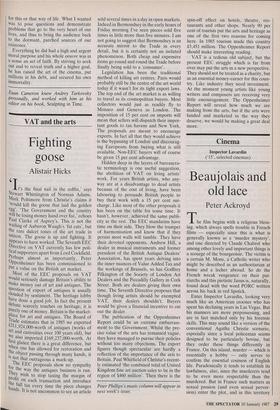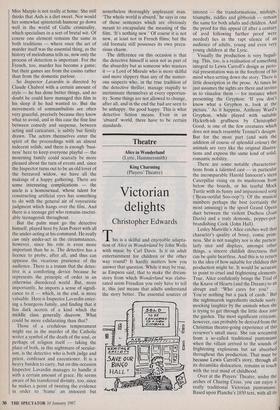Cinema
Beaujolais and old lace
Peter Ackroyd
The film begins with a religious bless- ing, which always spells trouble in French films — especially since this is what is generally known as a 'murder mystery', and one directed by Claude Chabrol who among other lovely and important things is a scourge of the bourgeoisie. The victim is a certain M. Mons, a Catholic writer who might be described as an authoritarian at home and a lecher abroad. So do the French wreak vengeance on their pat- riarchs and this pietistic Janus is, naturally, found dead with the word PORC written across his back in red lipstick.
Enter Inspector Lavardin, looking very much like an American crooner who has spent his declining years in Las Vegas. But his manners are more prepossessing, and are in fact matched only by his forensic skills. This may sound like a version of the conventional Agatha Christie scenario, especially since a local policeman seems designed to be particularly bovine, but they order these things differently . in France. On this island, murder — which is essentially a hobby — only serves to confirm the essential cosiness of English life. Paradoxically it tends to establish its lawfulness, also, since the murderers tend to be even more respectable than the murdered. But in France such matters as sexual passion (and even sexual perver- sion) enter the plot, and in this territory
Miss Marple is not really at home. She still thinks that Aids is a diet sweet. Nor would her somewhat spinsterish humour go down well in the world of Gallic criminality, which specialises in a sort of brutal wit. Of course one element remains the same in both traditions — where once the act of murder itself was the essential thing, as the history of melodrama tells us, now only the process of detection is important. For the French, too, murder has become a game; but their games are from the casino rather than from the domestic parlour.
So Inspector Lavardin is directed by Claude Chabrol with a certain amount of style — he has done better things, and no doubt he could have managed this film in his sleep if he had wanted to. But the movements of somnambulists are often very graceful, precisely because they know what to avoid, and in this case the fine line between comedy and suspense, between acting and caricature, is subtly but firmly drawn. The actors themselves enter the spirit of the proceedings with an almost indecent relish, and there is enough 'busi- ness' here to keep everyone playful — the mourning family could scarcely be more pleased about the turn of events and, since the Inspector turns out to be an old lover of the bereaved widow, we have all the makings of a happy gathering. There are some interesting complications — the uncle is a homosexual, whose talent for constructing artificial eyes has something to do with the general air of voyeuristic judgment which hangs over the film. And there is a teenage girl who remains inscrut- ably teenagerish throughout.
But the palm must go the detective himself, played here by Jean Poiret with all the under-acting at his command. He really can only under-act in the circumstances, however, since his role is even more important than he is. The detective has a licence to probe, after all, and thus can appease the vicarious prurience of the audience. There is a truism that the detec- tive is a comforting device because he represents the principle of order in an otherwise disordered world. But, more importantly, he imports a sense of signifi- cance to it — which, in the end, is more valuable. Here is Inspector Lavardin enter- ing a bourgeois family, and finding that it has dark secrets of a kind which the middle class generally disavow. What could be more exhilarating than that?
Those of a credulous temperament might see in the murder of the Catholic writer a symbol of the death of the soul, or perhaps of religion itself — taking the place of both, in this nightmare of secular- ism, is the detective who is both judge and priest, confessor and executioner. It is a heavy burden to carry, but on this occasion Inspector Lavardin manages to handle it with a certain amount of grace. He seems aware of his transferred divinity, too, since he makes a point of twisting the evidence in order to 'frame' an innocent but nonetheless thoroughly unpleasant man. 'The whole world is absurd,' he says in one of those sentences which are obviously meant to encapsulate the meaning of the film. 'It's nothing new.' Of course it is not new, at least not in French films; but the old formula still possesses its own preca- rious charm.
The difference on this occasion is that the detective himself is seen not as part of the absurdity but as someone who masters it — a Lord of Misrule who is more skilful and more slippery than any of the numer- ous suspects who, in the true tradition of the detective thriller, manage stupidly to incriminate themselves at every opportun- ity. Some things are not allowed to change, after all, and in the end the bad are seen to be unhappy, the good happy. This is what detective fiction means. Even in an 'absurd' world, there have to be certain standards.











































 Previous page
Previous page